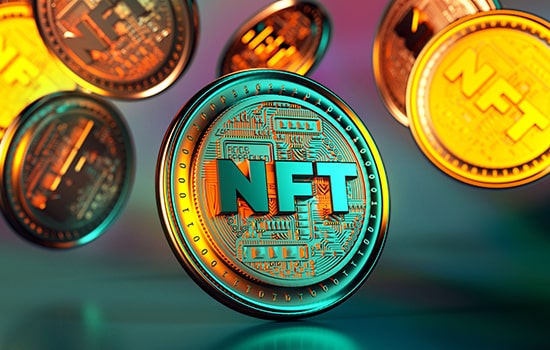WHAT ARE NFTs?
Digital assets known as NFTs or non-fungible tokens are unique and can’t be switched one-for-one for the next asset. The validity and provenance of the assets are guaranteed by the storage of the commodities on a blockchain, a decentralized, shared database.
WHY GET NFT LICENCED?
For NFT licensing, there is a contractual agreement outlining the ownership and use rights of specific intellectual properties, such as:
● Art
● Gaming
● Media and Entertainment
● Sports
● Real Estate
● Virtual Recognition in Metaverse

Never miss a drop of revenues from your NFTs!
Get your NFTs licensed today!
Here’s
Our Process
Digital Ownership
At Ritude, we are committed to helping you with NFT Licensing. We know that the process of obtaining a digital license for your Non-Fungible Tokens (NFTs) can be a difficult and time-consuming task, so we strive to make the process as simple and straightforward as possible.
Providing Strategies
When you come to us for assistance with NFT Licensing, we will first review your needs and provide an assessment of the best strategies for obtaining a license.
Determining the type of license
To start the process, we will work with you to determine the type of license that best suits your needs. We’ll then check your compliance with all pertinent laws and regulations. Once the license is approved, we will help you with the registration process, ensuring that all of your documents are properly completed and submitted.
Implementation of the license
Once the license is approved, we will help you with the implementation of the license. We will provide you with the necessary guidance and resources to help you understand the process and ensure its successful implementation. We will also provide ongoing support to help you manage and maintain the license, as well as answer any questions you may have.
Update and Maintenance
Finally, we will help you with the renewal process, ensuring that the license is kept up-to-date and in good standing. We understand that the process of obtaining and maintaining a license can be complex, so our team is here to provide you with the support and guidance you need every step of the way.

You push your creativity locally!
Now, let’s make you global with NFT Licensing!
But what will you get choosing Ritude as your NFTs Licenser?
Ritude is an innovative new platform that is revolutionizing the way digital art is licensed and monetized. With Ritude, you can easily license your artwork as a Non-Fungible Token (NFT) and monetize it in a secure and efficient way. Here are some of the reasons why you should consider choosing Ritude for your NFT licensing needs:
Security
Ritude provides the highest level of security for your artwork, with its patented blockchain-based platform. All licenses are securely stored on the blockchain, ensuring that your artwork is protected from fraud and theft.
Transparency
With Ritude, all transactions are completely transparent, meaning you can easily track and verify all transactions. This guarantees safe and precise financial dealings for all parties involved.
Simplicity
Ritude makes it easy to license your artwork. Managing licenses and keeping tabs on payments is a breeze. This makes it simple to manage your artwork and get paid for it.
Flexibility
With Ritude, you can modify your licenses to exactly how you want them to work. You can choose from a variety of license types, such as exclusive, non-exclusive, and royalty-free.
Cost-Effective
Ritude is a cost-effective way to license your artwork. There are no extra fees, and the transaction fee is a flat rate. Anyone looking to save money will like this feature.
Overall, Ritude is a first-rate choice for anyone looking to license their artwork as an NFT. You can sell your work in a method that is safe, open, and inexpensive. With Ritude, you can easily protect and monetize your artwork without the hassle and expense of traditional licensing.
Secure your artworks before they are stolen!
Connect with us to safeguard your properties!
FAQs
2. What types of assets can be tokenized as NFTs?
NFTs can be used to tokenize a vast array of digital assets, including but not limited to artwork, music, videos, tweets, virtual real estate, and even memes. Essentially, any unique digital asset can be transformed into an NFT, giving it a verifiable and immutable record of ownership on the blockchain. This opens up exciting new possibilities for creators and collectors alike, allowing for the creation and trade of one-of-a-kind digital assets in a secure and transparent manner.
3. When compared to conventional digital currency, what distinguishes NFTs?
The main difference between an NFT and a regular cryptocurrency is that NFTs represent ownership of a unique digital asset, while cryptocurrencies represent a unit of value. While both are built on blockchain technology, cryptocurrencies like Bitcoin or Ethereum are fungible, meaning one unit of the cryptocurrency is interchangeable with another. On the other hand, NFTs are non-fungible and unique, representing a specific piece of digital content with a verifiable record of ownership. NFTs have opened up exciting new possibilities for creators and collectors alike, allowing for the creation and trade of one-of-a-kind digital assets in a secure and transparent manner.
4. How dangerous could it be to put money into NFTs?
There are a number of dangers that investors taking on NFTs should be cognizant of. The risk is the potential for fraud – due to the newness of the market, there have already been instances of fraudulent sales and scams. Additionally, the underlying content of an NFT may not retain its value over time, making the NFT less valuable or even worthless. Finally, regulatory uncertainty may pose a risk, as governments may seek to regulate the market or ban NFTs altogether. Investors should carefully consider these risks and conduct thorough research before investing in NFTs.
5. What is the future of NFTs?
Using footage that hasn’t been granted a license can have serious, far-reaching legal repercussions. Depending on the jurisdiction, the use of unlicensed video content may be considered copyright infringement, a violation of intellectual property rights, or even a criminal act. Unauthorized use of video footage can occasionally lead to civil fines, such as the need to pay compensation and lose revenues, or even criminal prosecution.

